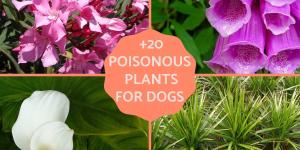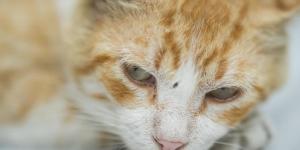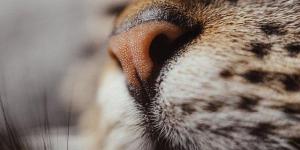My Cat Ate Poinsettia Plant Leaves



See files for Cats
Although it is a plant which can be enjoyed all year, the poinsettia is known for its association with Christmas. This is because the beautiful flower of this plant blooms toward the end of the year, often during the holidays. Like Christmas itself, it is a relatively short, but beautiful time which is enjoyed for its brilliant red petals sprouting from the deep green of its leaves and stems. Although this bloom is brief, it is enough time to attract a curious cat.
At AnimalWised, we look at what happens if your cat ate poinsettia plant leaves or flowers. We look at how toxic this might be and see what symptoms occur with poinsettia poisoning in cats.
What is the poinsettia plant?
The poinsettia is a plant native to the Americas, specifically central America and Mexico. Their association with Christmas is strong in North America and other regions, but they are associated with Easter in Spain. The plant belongs to the Euphorbiaceae family and its scientific name is Euphorbia pulcherrima. In the wild it can reach 3 meters in height, but in our homes it is a perennial plant which does not usually grow very tall.
The red and green tones characteristic of the poinsettia plant are associated with the festive period. The poinsettia can also be seen in other colors such as pink, white, ivory or salmon. Many cats are interested in this plant and begin to nibble on its leaves or petals.
Importantly for our companion animals, poinsettia are toxic to dogs and cats. There are numerous toxic plants for cats, including lilies, azalea, daffodils, ivy, kalanchoe, diaphembaquia and oleander. The toxicity of each plant will vary. How they affect the cat will depend on whether they are ingested or if they cause a contact reaction.
How toxic is poinsettia to cats?
The reason why poinsettia is toxic to cats is due to irritating toxins known as diterpenic esters. These are derived from phorbol, flavonoids and euphorbone. These compounds are found in the latex of the poinsettia. Not all angiosperms (flowering plants) contain latex, but poinsettia is one of them. It is a milky white and sticky substance which coagulates when exposed to air.
Latex is exposed when there is trauma or an abrasion to the plant. This can occur when the cat tries to bite or even scratch the poinsettia. If the cat bites the leaves, stem or even the petals, they are exposed to the latex. If it enters the cat's mouth, it can irritate the mucus membranes in the oral cavity and throughout the digestive tract.
Since cats like to rub up against various objects, it is possible they will rub against a poinsettia which has exposed latex. If it gets on their fur, it can pass to their mouth when they groom themselves. It can also pass on to other cats which might be grooming them. A cat's eyes are also very sensitive, so it is possible the poinsettia sap will irritate the conjunctiva (mucus membranes) on their eyelids. In these cases we might see the cat's third eyelid becomes exposed.
However, it is possible to overstate the toxicity of poinsettia poisoning in cats. Firstly, while cats will often eat certain types of grass, they will not necessarily be attracted to the poinsettia. Secondly, although toxic to cats, dogs and horses, the toxicity is not very strong. According the the ASPCA, the toxicity is “over-rated”[1]. They may suffer from intoxication, but it will likely be mild and many will have no adverse side effects.
Symptoms of Poinsettia Poisoning in Cats
In rare cases where the cat does have an adverse reaction due to contact with poinsettia, we need to be aware of the possible side effects which may occur. With a contact reaction (i.e. the poinsettia plant touches the skin), the most worrying symptoms affect the eyes. If the sap gets into the eyes of a cat, it can lead to keratitis, conjunctivitis and, potentially, corneal ulcers.
If the irritants from the poinsettia plant touch the skin, the result might be inflammation of the skin, redness and itching of the affected area. Generally, the cat will need to have either a sensitivity to the compounds in the sap or a lowered immune system for a serious reaction to occur.
With toxicity due to chewing or ingestion, the symptoms will be mostly gastrointestinal. However, other symptoms affecting mood can occur:
- Lethargy
- Irritation of the mucous membranes of the mouth and digestive tract
- Glossitis and pharyngitis (inflammation of the glottis and pharynx)
- Dysphagia (difficulty swallowing)
- Excessive salivation
- Vomiting
- Diarrhea
For cases where the cat has ingested large amounts of toxic plant matter, symptoms can include tremors, delusions and even coma.
The severity of the reaction will depend on the individual cat. In the majority of cases, symptoms will be mild if present at all. Since the toxic substance will pass through the digestive tract, it is possible that cats with prior organ damage can sustain further injury. This can lead to organ failure, but only in cats with prior medical problems. We should take the cat to a veterinarian if symptoms persist for more than 12 hours or if it might exacerbate underlying problems.

What to do if my cat eats a poinsettia plant
When a cat has been in external contact or has eaten some part of a poinsettia plant and show adverse reactions, we should take them to the veterinarian. If they have mild symptoms such as vomiting and/or diarrhea, but they persist for more than 12-24 hours, they should also be taken to the veterinarian. How acute is the problem will depend on the amount of toxin and the length of exposure.
The general treatment for poinsettia poisoning includes:
Treatment of external poinsettia poisoning in cats
As we have stated above, even if the cat does not ingest the plant, contact of the irritating sap can cause a reaction. This is especially the case if it comes in contact with the eyes. Depending on the case, the treatment to be applied will be:
- When the toxicity has been cutaneous (on the skin), the animal should be bathed. If they have dermatitis, corticosteroids or antihistamines will likely be administered for a week's duration.
- If the contact has been ocular, the eye should be washed with lukewarm saline and then apply specific eye drops with drugs such as atropine (due to its dilating and sedative effect). Antibiotics will be administered if there are any secondary infections and corticosteroids such as dexamethasone when there are no ulcers, but inflammation is significant.
The above treatments can only be prescribed by the veterinarian after their accurate diagnosis is carried out.
Treatment of ingestion poinsettia poisoning in cats
When toxicity comes from ingestion of the plant, as there are no specific antidotes to poinsettia toxins, the following measures may be taken:
- Use of activated carbon due to its adsorbing capacity for toxins that have entered the body orally.
- Force diuresis (urine production) using mannitol or hypertonic glucose medications.
- If the plant has been ingested for less than two hours, vomiting induction can be effective, but only if the cat is conscious. It it normal for the cat to start vomiting on its own after ingestion of the plant. It is usually more common for a stomach pump to be performed in serious cases of intoxication.
Symptomatic treatment
The treatment aimed at alleviating the symptoms that the cat poisoned by poinsettia presents consists of:
- Rinsing the oral cavity with sodium gluconate
- Fluid therapy with intravenous serums (isotonic saline or lactated Ringer)
- Anti-inflammatories
- Stomach protectors
- Antiemetics
- Inhibitors of digestive motility
- Drugs with action on the nervous system if necessary in cases of large ingestions with nervous signs
Again, it is very important we take the cat to a veterinarian for diagnosis and treatment options. We should not treat them ourselves or try to induce vomiting without explicit direction by the veterinarian.
Severe intoxication or poisoning can be fatal. This is not likely to occur in poinsettia poisoning in cats. If your cat's life is threatened, they will show the symptoms shown in the video below:

This article is purely informative. AnimalWised does not have the authority to prescribe any veterinary treatment or create a diagnosis. We invite you to take your pet to the veterinarian if they are suffering from any condition or pain.
If you want to read similar articles to My Cat Ate Poinsettia Plant Leaves, we recommend you visit our Other health problems category.
1. ASPCA. (n.d.). Poinsettia.
https://www.aspca.org/pet-care/animal-poison-control/toxic-and-non-toxic-plants/poinsettia
- Animal's Health. (2020). The Poinsettia, a danger for pets. Available at: https://www.animalshealth.es/mascotas/la-flor-de-pascua-un-peligro-para-las-mascotas
- Cat things. (2011). The Poinsettia or Christmas Flower is toxic to cats. Available at: http://www.cosasdegatos.es/cuída-gato/flor-de-pascua-flor-navidad-toxica-para-gatos






